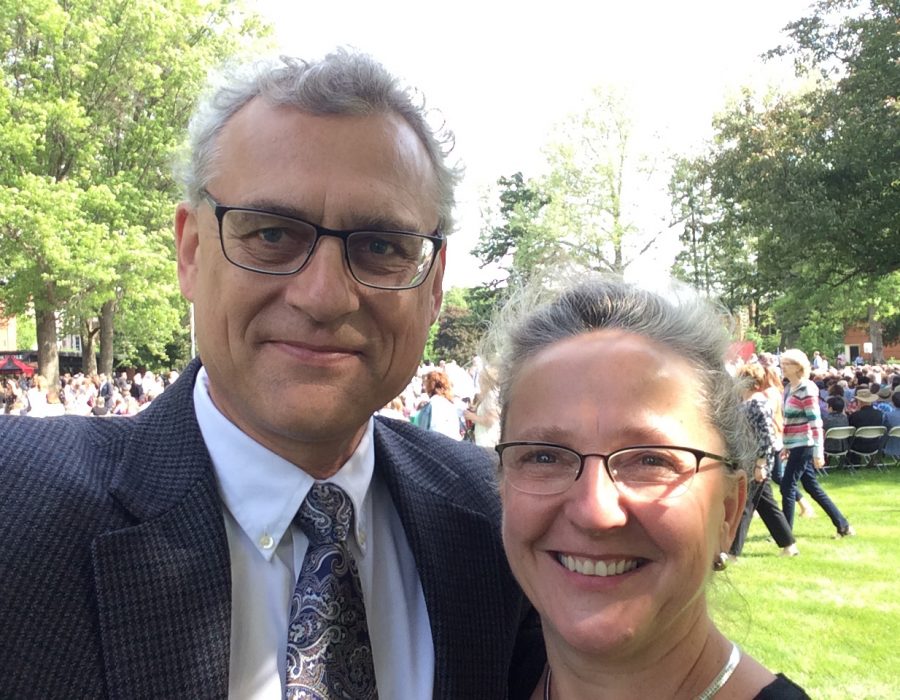UNI History professors celebrate 31 years of marriage
On Feb. 5, professors Konrad Sadkowski and Alicja Boruta-Sadkowski celebrated 31 years of marriage. They both work in the history department.
Feb 19, 2018
Several continents, multiple degrees, immigration issues and family differences stood the test of 31 years of marriage for two UNI professors, Konrad Sadkowski and Alicja Boruta-Sadkowski. Both work within the UNI History Department where, among other courses, Konrad teaches Humanities II and III and Alicja teaches Russia/the Soviet Union.
Both Konrad and Alicja are originally from Poland, although Konrad moved to the United States at the age of five. He later attended Brown University.
On Jan. 4, 1984, Konrad was back in Poland, studying abroad and visiting a friend. Konrad accompanied his friend to the University of Warsaw where Konrad friend’s girlfriend attended school. At her dorm, Konrad met Alicja, who happened to be the girlfriend’s housemate.
“When I opened that door, I thought, ‘With this guy, I could spend the rest of my life,’” Alicja recalled. “There was something in him — besides his curly hair — something nice, something good.”
“[Alicja’s] got this incredible twinkle in her eye,” Konrad added. “And her smile, of course, is infectious. These things are very captivating and magical. I think a lot of people see that.”
Konrad and Alicja’s first dates in 1984 were simple ones in Alicja’s dorm. Konrad remained in Poland until June when he left to travel throughout Europe. He returned to Poland in August to visit Alicja. Then he left again for nearly a year.
“It was heartbreaking when he was leaving,” Alicja said. “I thought the world collapsed. My life was over. “
During those months, Konrad and Alicja stayed in contact through letters.
“[Because of] the international connections between Poland [and] the United States, you couldn’t just pick up a phone and call. You had to reserve a phone call,” Konrad said. “That international operator would create that phone call, which would take up to half a day sometimes.”
In July 1985, Konrad invited Alicja to the United States. At the time, Alicja only knew two words of English: yes and no.
“But the U.S. government in the mid-80s was rejecting maybe, from what I heard, about 97 out of 100 visa applications for Poles to come to the United States. So, it was very difficult to get a visa,” Konrad explained. “So, what I decided to do was apply for what was called a K-1 visa, which was a fiancée visa. That’s how Alicja was allowed to come here.”
With this visa, if Konrad and Alicja didn’t marry while Alicja was in the U.S., Alicja would have to return to Poland. The two married on Feb. 5, 1987.
The distance early on was not the only obstacle in their relationship — another was religion. While Konrad comes from a Catholic background, Alicja is part of the Eastern Orthodox Church.
The difference of religion was never an issue for the two of them or for Alicja’s family. But it was more complicated for Konrad’s parents, who were very traditional.
Poland is a predominately Catholic country. Although Konrad’s family no longer lived in Poland, they still hoped their son would marry an ethnic Polish and Catholic woman.
“When my parents discovered that Alicja was Orthodox and Belarusian ethnically, which meant Russian to them — those were all red flags,” Konrad said. “Initially when I told [my father] we were going to get married, he said, ‘I don’t want the wedding here,’ which was in Western Massachusetts. And I said, ‘Okay, fine — we’ll just get married in Ann Arbor, [Michigan]. And shortly before the wedding, he relented and said, ‘Well, why don’t we actually go ahead and have it here?’ And I said, ‘Well, it’s too late now. All the plans have been put into place.’ And so, we married in Ann Arbor in just a civil service, but my parents decided not to come.”
One major turning point for Konrad’s parents was the baptism of Konrad and Alicja’s first son, Ben. Alicja didn’t see any problem with baptizing their son in a Catholic church as opposed to an Orthodox one.
“[Ben] being the first grandchild for my parents was a big deal,” Konrad said. “Maybe it was a bit of a makeup for them not coming to the wedding, and so my father threw this big elaborate party with a live band — kind of like a traditional Polish wedding.”
In Alicja’s opinion, having young children was one of the most difficult times in their marriage.
“Once you have children — and we had both our boys in graduate school — it’s hard. That can complicate things,” Alicja said. “If your baby is colicky and screams 24/7 for three months, it’s not a nice picnic.”
“Marriages just require practice, as any couple that’s been married can tell you,” Konrad said. “To have a successful marriage takes a lot of patience and flexibility and willingness to work things out instead of closing up and sticking to your guns.”









Matthew Moore • Feb 21, 2018 at 3:15 pm
I love these two to death. I studied abroad with Konrad twice and Alicja came once. Their son Ben also came once and those two experiences were some of the most magical experiences in my life. They both have a passion for student learning and are the easiest people to talk to.
To many more years!
Na Zdrowie!